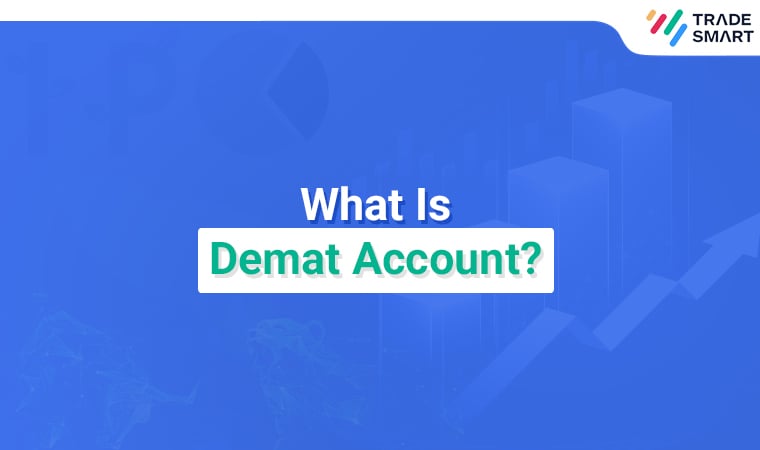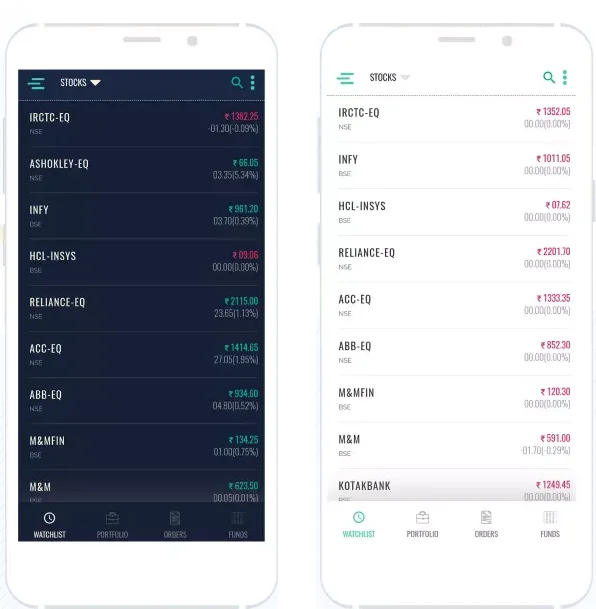What is Demat Account?
Feb 11 2022 6 Min Read

Ever since the initial public offers (IPOs) started raining and the stock markets began the journey of their biggest rally, DEMAT Accounts have been the stock of the town. In the fiscal year ended March 31, 2018, Indian investors opened a record number of Demat accounts, largely due to the global pandemic and the disruptions caused by the business disruptions. The numbers talk for themselves, don’t they? It is not late if you are new to investing.
In this blog, we will enlighten you with all the details regarding DEMAT Account so when you go out to the next social meetup and this topic comes up, it should feel like a familiar subject.
DEMAT Account – What does it mean?
First things first. The term DEMAT is a shorter version of dematerialized shares. After dematerialization, the shares were converted into an electronic form from the physical form, and the Demat account became the safe house for such electronic shares.
A Demat Account is similar to a bank account that enables investors to hold their shares and other securities in electronic format. It eliminates the need for maintaining paper documents for these types of investments.
What is Dematerialization?
Converting physical securities to electronic form is known as dematerialization. This process helps minimize the cost and complexity of doing business. Earlier, the shares of the companies were held in physical form such as pieces of paper. A company used to issue a share certificate in the name of the shareholder mentioning the number of shares held by them.
Many issues such as physical damage, loss, theft, forgery, etc. used to take place and it was a tedious process to transfer those physical shares. Dematerialization is nothing but the conversion of those physical shares into electronic form. Today, we do not have physical shares in the market. As per the SEBI Guidelines, all the physical shares have been mandatorily converted into dematerialized form.
Dematerialized shares allow easy transfer and all the problems related to theft, forgery, etc, have been taken care of with this change.
Depositories and Depository Participants
A depository is an organization that stores financial assets electronically which aids traders in buying, selling or holding these assets. In India, we deal with two depositories that are maintaining all demat accounts in the country. These are
- National Securities Depository Limited (NSDL)
- Central Depository Securities Limited (CDSL)
But you cannot deal with the depositories directly and are required to go through a depository participant like TradeSmart. They act as an intermediary between you and the depository.
How does Demat account work?
While buying and selling of stocks happens through a trading account, the demat account is used to hold the shares bought through the trading account. That’s why it’s important to link your demat account with your trading account though today, both the trading and demat account are opened together. The following points tell us how the demat account works.
- After placing a buy order on your trading platform, a buy request is forwarded by your depository participant to the stock broker.
- The stock exchange then matches your buy request with a similar sell request and then sends an order to the clearing house.
- Once found, the clearing house then debits the specific number of shares from the seller’s account and credits it to your account at the close of the share market.
Types of DEMAT Account
There are three kinds of DEMAT Account available in India. Let us discuss them below.
-
A Regular Account
You can open a regular Demat account with any of the participating banks or financial institutions in India. This type of account does not provide any additional facilities, say, international transfer of funds for instance.
-
Repatriable Account
If a non-resident Indian carries out some business activity in India, then they have to open a special non-resident rupee account (SNNR). It is a current account. An investor who has an SNNR Account can open a repatriable Demat account that allows them to transfer funds internationally.
-
Non-repatriable Account
Like SNNR Account is a current account, a non-resident Indian can open a non-resident ordinary account (NRO) which is a savings or fixed deposit account. Investors with NRO accounts can open non-repatriable Demat accounts. This account does not facilitate the international transfer of funds.
Components of DEMAT Account
A DEMAT account has the following main components.
-
Depository
Depositories are the parties that hold the shares in the dematerialized form electronically. In India, there are two depositories – National Securities Depository Ltd. (NSDL) and Central Depository Service (India) Ltd. (CDSL).
-
Depository Participants
Depository Participants, commonly known as DPs, are the agents of depository that facilitate buying and selling of shares electronically by providing a trading platform to their clients.
-
Investor
The individuals like you and me who hold the DEMAT Account and invest in shares and other investments assets.
-
Client DP ID
This is a 16-digit exclusive identity number assigned to each investor (client of the depository participant). With the help of this unique identification number, it becomes easier and safer to transfer the shares from one account to another.
Features of DEMAT Account
Features of a DEMAT Account vary from broker to broker. Some brokers also offer various plans with different features to their clients. TradeSmart offers some of the best and most competitive features in the industry. Some of them are included below.
- A trading terminal or platform that is easy to understand for beginners
- Market depth with bid and offer prices and the total number of buying and selling orders
- Customizable watch-list with multiple rows
- A full-features technical chart with multiple indicators
- A mobile application to support quick actions on the go
- Basic fundamental analysis of the companies
- Portfolio analysis with details such as overall position, day’s position, percentage change, the total return on investment, etc.
- Secure, biometric login process
- Cover, bracket and after market orders feature on the app.
Benefits of DEMAT Account
Following are some of the benefits of the DEMAT Account.
- With DEMAT, traders can make transactions without having to enter their details in a paper trail. It’s also convenient and time-saving.
- No risk of theft or forgery since these securities are stored electronically.
- You can now manage all of your debt and equity instruments in one platform. It includes an automated credit facility that can be used for various purposes, such as bonuses, splits, and mergers.
- Electronic alerts are sent to every stakeholder of the transaction, allowing them to easily and quickly contact the company, investor, or any other stakeholder in case of any discrepancy.
- The account holder can transfer their entire or a portion of their portfolio to another person. All that is required is filling a Delivery Instruction Slip.
- The securities in a Demat account are linked to the company. In this case, if there is a split in the company’s equity or bonus is declared, the investor is notified and the transaction is automatically given effect immediately.
Demat account charges
While opening a demat account is not very hard and takes hardly any time, there are certain charges levied by the DP to maintain the demat account and ensure that smooth transactions take place whenever you trade. There are various charges like account opening fees, annual maintenance charges (AMC), custodian fees that a trader needs to incur. The details and definitions of each are given here. The charges TradeSmart provides can be summarised in the table below.
| S.No | Particulars | Charges |
| 1 | Account Opening Charges | FREE* |
| 2 | Dematerialisation charges | Rs 500 per certificate |
| 3 | Demat transaction charges | Rs 15 + Service tax |
| 4 | Off Market transfer (DP) | Rs 25 + Service tax |
| 5 | Inter DP transfer | Rs 25 + Service tax |
| 6 | Trade on phone | Rs 20 + per executed order plus service tax |
| 7 | Physical contract note / other statements etc | Rs 20 per contract note + courier charges |
| 8 | Demat AMC | Rs 300 + Service tax |
| 9 | Cheque dishonour charges | Rs 200 per instance |
| 10 | NEST Instant fund transfer charge | Rs 8 + service tax |
| 11 | Third party fund transfer charges | Rs.400 (For refund in 2 working days) |
| 12 | For refund in 2 working days | Rs 400 |
| 13 | For refund in 15 working days | Rs 200 |
So as you can see, the charges levied for the demat account by TradeSmart are extremely competitive in the market and the advantage is that it is free for the first year and nominal charges are billed from the second year onwards. So you can open a demat account for free and begin your trading journey.
Demat account and Trading account – Are they the same?
It is important to know that when you open a new demat account, it may seem like you’re opening only one account, but in reality there are two accounts that are interlinked , that is, the trading account and demat account. In today’s time, when you open an account with any of the depository participants like TradeSmart, you open both a demat account and trading account at the same time. They are opened together because in order to conduct smooth and hassle free trading, both are dependent on each other. A demat account is used to store your securities that you purchase and a trading account is used for buying and selling of these securities. When someone speaks of or uses the word demat account in a statement, it is understood that it means both trading and demat account. Although it is possible to open both accounts separately, doing so only makes your job tedious and unnecessarily time consuming.
Conclusion
While the above information contains a lot of benefits for having a demat account, there are even more that can be discovered only when you open one. In fact, one more feature is that you can temporarily freeze your demat account as well. The benefit is that whatever shares are stored in that cannot be touched by the broker or cannot be sold in cases where there is fraudulent activity going around. This gives an extra layer of protection for your securities and can only be reactivated by the account holder after submitting his details. So the possibilities are endless, all you have to do is open one and see for yourself.
Frequently Asked Questions
A depository is a type of financial institution that enables investors and traders to store and liquidate securities in dematerialized form. On the other hand, depository participants are approved by a depository to act as its agents. NSDL and CDSL are depositories in India whereas the brokers like TradeSmart with whom you open the DEMAT Account are depository participants.
You can use your DEMAT Account as collateral to borrow money from financial institutions. Some depository participants facilitate borrowing of trading margin based on your investments held in the DEMAT Account.
Yes, the shares allotted to the investors after applying for initial public offers are directly credited to their DEMAT Accounts after successful allotment. This process takes place automatically through the centralized system.
You need a DEMAT Account to buy and sell the shares at your convenience. There is no risk of theft of your investments as DEMAT works as a safehouse. With DEMAT Account, the time and cost of trading and investing have been reduced to a great extent.
It is possible to change the registered residential address in your DEMAT Account after providing necessary documents to the broker such as the proof of new address and identity proof of the account holder.

